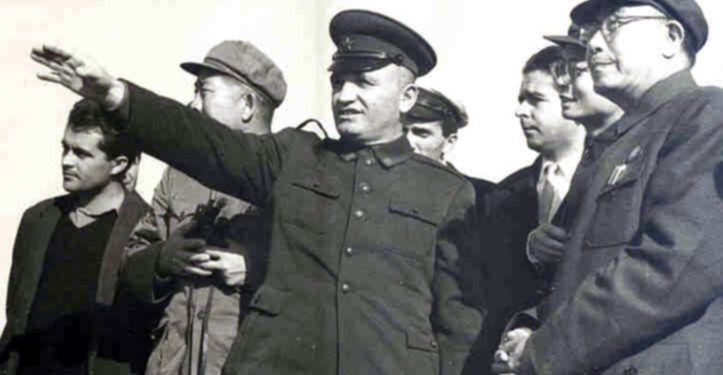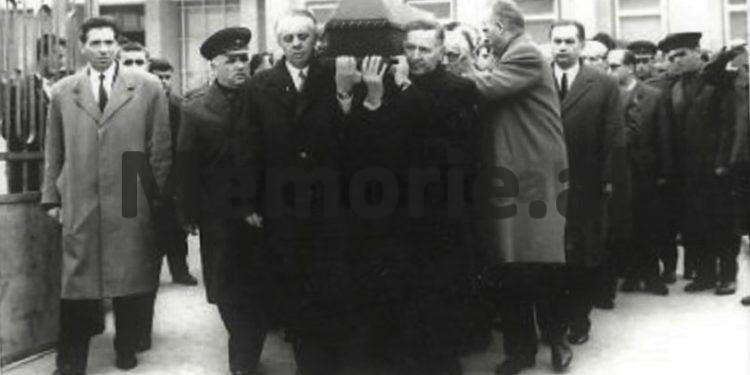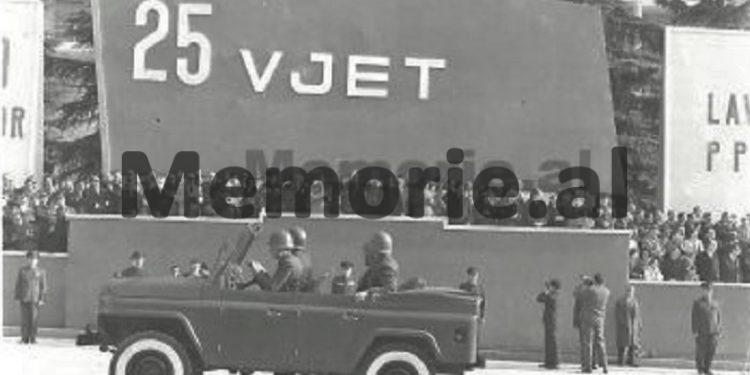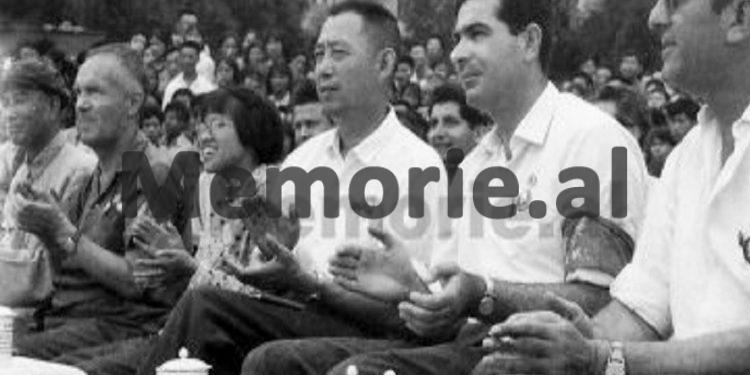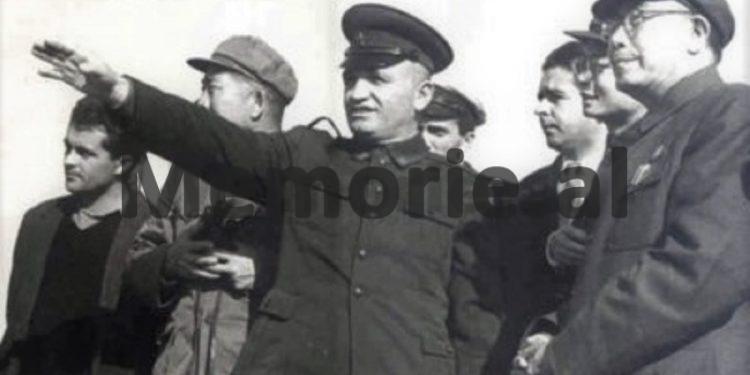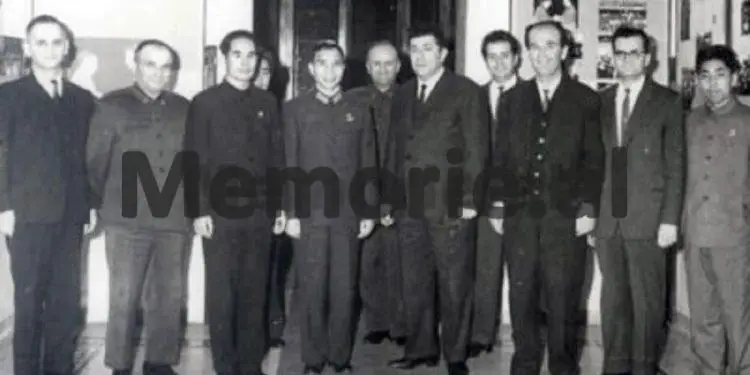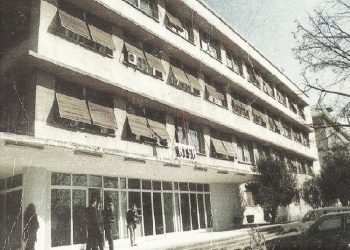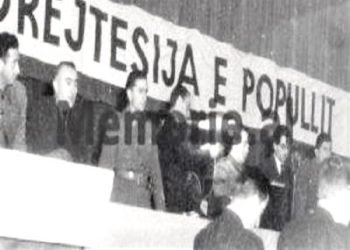Dashnor Kaloçi
Memorie.al publishes a full letter from former Defense Minister Beqir Balluku to Enver Hoxha, dated September 18, 1974, sent by Roskovec where he initially suffered internment, accused of being “an enemy of the party and the people”. In the full 24 pages of that letter, Balluku explains everything to his former boss, from the war period to the day he was away, away from friends and separated from his family. And with the big mark as “politically executed” he begs Enver and the Party to put their hand into their hearts and give them the opportunity to spend the next few years of their lives with society socialist, giving his contribution even in hard labor… ?!
His name became known during the Anti-Fascist National Liberation War in the first half of the 1940s when he led guerrilla units of the city of Tirana, and later as Commander of the II Attack Brigade. After the war, Balluku would be appointed Chief of the General Staff of the Army with the rank of Major General, replacing General Spiro Moisiu. From that time until his career ended in 1974, Beqir Balluku would hold a number of senior party and state functions, such as: Deputy Prime Minister, Minister of Defense, Member of the Political Bureau, and Member of Parliament in all. legislatures. He was regarded as one of Enver Hoxha’s most loyal people until the late 1960s, which would provoke envy and jealousy on the part of Prime Minister Mehmet Shehu, who in the future saw himself as de jure and de facto as the successor of Enver Hoxha. Balluku would gain a lot of credentials in Hoxha’s eyes for his gesture of loyalty to the top leadership of the SPL when the latter were in a very delicate political situation at the 81 Party Conference in Moscow, where he himself (Balluku would declare to the Soviet Ambassador to Tirana, Shikin, that; “If an unpleasant surprise came to the Albanian leadership in Moscow, all Russian citizens living in Albania would be executed without warning.” So even for this fact, after breaking up with the Soviets, the figure of Balluku would have seen an immediate increase in political career, up to the most critical moment of the institution that Balluku himself represented, the removal of the ranks of the Albanian army in 1967. The first crack The silence between Balluku and Hoxha would take place in 1967, when the powerful chief of the Counter-intelligence for the Army, Major General Halim Xhelo, would write the famous anonymous letter to Enver Hoxha protesting for the removal of the Albanian army from the rank system. After discovering Xhelo’s letter and imprisonment, Hoxha, and especially Shehu, would see with great suspicion its true authorship, as it was written under Balluku’s nose, and if he was hiding behind Xhelo, at worst he should had been aware of its existence. At least this was alluded to at the time in the corridors of the Ministry of Defense and the Central Committee of the ASP. If that were not enough, the frequent clashes between Beqir Balluku and his deputy Chief of General Staff, Lieutenant General Petrit Dume, would begin in the late 1960s and early 1970s. Dume, which would provoke some meetings of the Political Bureau, especially over this hassle between the two top military figures. So frequent would be the hassle of the Balluku-Dume hassle, that Beqir himself would have asked Enver Hoxha to resign from the post of Minister of Defense in some extraordinary meetings. A thing that was then categorically rejected by Hoxha. Another pivotal moment for Balluk, who seemed to be “filling the cup”, which cast many doubts but for Hoxha-Shehu, would be the visit of Beqir Balluku at the head of a delegation of senior Army exponents to China. in 1972. During this visit, Chinese Prime Minister Chu En Lai would reject the official request of the Albanian state to send military technology materials, making it clear: “No matter how many weapons we give you, Albania cannot stand an attack. military of the Soviet Union. Your best way to resist, is to retreat to the mountains, or as it is called in military language, the “Slide Theory”. You have to create a Balkan (Tirana-Belgrade-Bucharest) anti-Moscow axis ”. Reportedly, security guards rush to report this fact to Albania’s leadership, adding here another mysterious piece of evidence that Beqir Balluku secretly went to the Soviet embassy in Beijing last night and negotiated with the ambassador and KGB chief. China about a handful of its possible statehood in Tirana in co-operation with 25,000 Soviet Spetznaz (State Security indictments). As if all this were not enough, Beqir Balluku would meet incognito at the airport of Romania, Romanian Defense Minister General Ioan Ionita hours before his arrival in Beijing. The details of this meeting have also remained obscure. But just two years after his visit to Beijing, the notorious August 1974 Army activity, which began at King Zog’s villa in Durres, would begin. At that meeting, which lasted two days, according to Enver’s message, Mehmet and Hysni invited all of Balluku’s subordinates to speak and discuss his “hostile activity”. It would be precisely the content of the “Black Theses”, which would cost dearly to the three main figures of the Albanian army; Baqir Balluk, Petrit Dumes and Hito Çako. It is noteworthy that on the day Balluku was declared a “traitor and a coup d’etat”, former Army Counter-intelligence Chief Halim Xhelo serving his sentence in Burrel Prison would mysteriously die in his cell. (It was said that day, he lost hope that he could be released someday with Balluku’s help). The Plenum of August 1974, however, would be the cautionary trial for the military caste, who would only days later feel all the rage of Hoxha, fury that would lead to the death of three a year later. . But before that happened, Beqir Balluku was interned in the small town of Roskovec, from where, on September 17, 1974, he would send a long letter to Enver Hoxha, where in 24 pages he would to explain everything to his chief who had served him devoutly since the time of the War. And that letter sealed in an envelope, Balluku entrusted only to his eldest son, Liberation, who brought it to the office of the Letters of Appeal in the Central Committee of the LLP. What is written in that letter, as Enver considered Beqiri’s self-criticism, and Mehmet Shehu’s notes on it, is disclosed through these documents that Memorie.al is publishing in full exclusively on this upcoming dossier, while what is worth the fact is that Beqir himself never learned the truth if that letter came into the hands of Enver Hoxha… ?! And so he must have escaped this life with the great pledge that his boss had not received the letter, otherwise it would have saved at least his life. This is also confirmed by the Balluku family members, who also had and maintained the same version as their father before the letter was discovered.
follows from the previous number
BEQIR BALLUKU LETTER FOR ENVER HOXHA
And finally I didn’t tell my friends about the bad start and finish of this material? Since I deal with the processing of material that was raised in the 12th Plenum of the Central Committee of the APL, Comrade Hysni has been aware of both me and the Central Committee’s military apparatus, certainly in general form without any details, while Comrade Enver and Mehmet are unaware, because I thought to hand over the ready material, as I did with the fourth material, this is a serious breach of the rules, which in this particular case I had to pose the problem with my friends and to obtain authorization to process such material or not. If I had followed this path, surely my own misconceptions would have been captured and hit in time. Why didn’t I do this? I did not do this because I thought that I was working on a topic based on the teachings and line of the Party and that this material, once finished, would be presented to my peers for approval. While his cancellation is unknown to any of my friends, without talking about Petrit and Hiton. Why did this happen? It has happened that I have seen and dealt with this issue liberally, without having to worry about digging into the causes that led me to these mistakes and faults. I would like to point out that the main problem I intended to address in this paper was the formation of combat, ie. occupying the first generation in the main directions with high firepower art-machine guns and provided with extensive genius fortification, while I was not enthusiastic about the activity in the form described and I would correct that in the finished material. In the fourth material of these problems I gave way to the known, ie. the art-mittalier forces are in the first scalon and the infantry forces in the second scalon and the activity is in line with the theses. Despite my attitude towards these materials that contradict myths and undignified Communist attitude towards the Party, it is a negative and liberal attitude towards mistakes and blame which you must courageously discover and condemn and fight with. stringency. Just as I have not cleaned the dust day by day, as Enver’s Party and Comrade teaches, foreign bourgeois-revisionist concepts and worldviews have taken over my head that led me to these mistakes and blames. So closing the third material in a simple manner without undertaking a rigorous political-ideological attack to eradicate these concepts, does not exclude the fact that in the future these materials were used by me, as the wound was not fingerprinted, my world of the interior had remained ill.
Balluku: I have violated Enver-Mehmet’s unity
Laying out and addressing the problems in the third material by arguing for the basis of his incorrectly and biased skewed theses in Comrade Enver’s speech, which emphasized that it is a speech that further affirms and enriches the theses, in a way inevitably leads to contradictions and to the bureaucratic unity between Comrade Enver and Mehmet, this is not only reflected in the book of quotations that accompanied the material, but its whole spirit, by misleading Comrade Enver and Mehmet, the material would be weighted and grounded. While there are problems and initiatives that are not my own in the third issue, it doesn’t matter, I am responsible for everything. The processing of this material has been traversed from the beginning to the end by foreign and wrong methods such as the removal of friends and apparatus, for two reasons: first, I am inclined to think that Petriti embraces the young with difficulty, I was convinced that it does not contribute to the design of this material that I considered right, besides I have thought that in general Petriti does not go into the study of problems deeply and patiently, and secondly, the factor that constitutes the essence of the problem lies in the fact that being influenced by foreign concepts has overwhelmed me with a sense of pride and arrogance, that here this scientific refinement, this topic as I called it, of working out and enriching the topics, the working group did under the my guidance. But from the above, I am again pointing out that just revising the principles of the first defense theme inevitably leads to the touching of the whole thesis and to the creation of a new platform, in the concrete case of anti-Marxism and with grave consequences for our protection, common sense here leads. In the process of this material my sedra has been particularly affected by peer objections, but I have called this issue normal and that in the process of work the differences will be flattened. The first reason I stepped down from the post of minister was because of poor relations between me and Petrit, especially after 1966 when our case was raised twice in the Political Bureau for my fault. I have always been troubled by the fact that Petriti is not always open to me, he accumulates and that my being responsible for himself does not distract him, he demands unlimited powers, that is, wide scope, beyond the bounds and limits of the States. , I have said several times that it is a good idea to propose that you become a free deputy minister and take over the sectors that I have a connection with, that he has not accepted. But after referring the matter to the Bureau, Comrade Petrit and Hito elaborated on the new scheme, where all weapons and services were focused on the Headquarters. I then agreed with this scheme. It is understood that on the basis of this the whole activity of the ministry was concentrated in the Staff and that the other bodies that remained outside it, all their activity had to build in harmony with this body, on the basis of this working method, I as a minister often for many important problems, I was uninformed and unable to help and raise problems in front of friends, I often petitioned Petriti to put her in touch with me./Memorie.al
follows tomorrow




